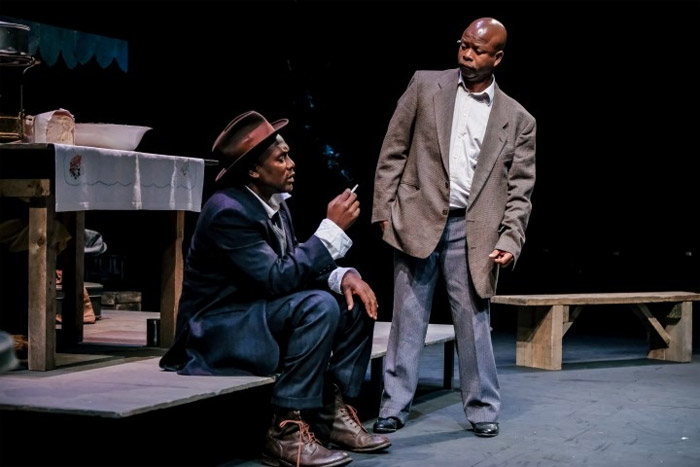Adapted and Directed by James Ngcobo
A Market Theatre Johannesburg production
Liverpool Playhouse
4th – 7th October 2017
Reviewed by Finvola Dunphy
Photograph by Andrew Billington
‘The Suitcase’ was first performed at the infamous Market Theatre in Johannesburg. This cultural hub of South Africa challenged the apartheid regime with the belief that culture has the power to change society.
The opening performance at the Liverpool Playhouse achieved just that. Set in 1950’s South Africa at the time of institutionalised segregation, the play’s heart wrenching love story is the bigger pivot of the narrative.
The core of the play is timeless, and holds particular resonance in contemporary society.
It depicts the struggles of a young couple, Timi and Namhla, played by Siyabonga Caswell Thwala and Masasa Lindiwe Mbangeni, moving to the big city full of dreams, hope and ambition. That city is Durban, one of South Africa’s most diverse, filled with the promise of opportunity.
But when opportunity does not present itself, the heartache and disappointment is all the more devastating. Reality soon hits and the couples’ previously unwavering enthusiasm begins to wither. Under increasing pressure to provide for his pregnant wife and repay their new neighbour for his hospitality, Timi’s moral compass deteriorates when he steals a suitcase left on a bus. Unaware of its devastating contents, the consequences that ensue are drastic.
The play captured the essence of traditional African story-telling, incorporating ritualistic movement, music, sound and language with seamless fluidity. Director, James Ngcobo blends the Durban dialect with English language, resulting in a truly authentic portrayal of the city’s diversity.
Being unable to translate the South African language did not hinder any aspect of the performance. The inflections and resonances could not be misconstrued as anything other than truth.
Hugh Masekela’s remarkable musical compositions were interweaved into the narrative and drove the plot forward. The talented on-stage guitarist and three singers worked in tandem with the main action on the stage and the effect was utterly mesmerising.
The multi-functional set was appropriately simplistic, simultaneously representing nowhere and everywhere. It provided the perfect backdrop by which to fully consume the gravity of the plot and appreciate the talented cast, as they showcase contemporary struggles with a vitality that encompasses every element of South African tradition and culture.
